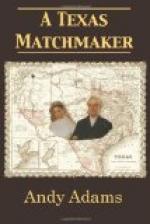Naturally, in expectation of the coming sport, the horses became the topic around the camp-fire that night. Every man present was a born horseman, and there was a generous rivalry for the honor in telling horse stories. Aaron Scales joined the group at a fortunate time to introduce an incident from his own experience, and, raking out a coal of fire for his pipe, began:—
“The first ranch I ever worked on,” said he, “was located on the Navidad in Lavaca County. It was quite a new country then, rather broken and timbered in places and full of bear and wolves. Our outfit was working some cattle before the general round-up in the spring. We wanted to move one brand to another range as soon as the grass would permit, and we were gathering them for that purpose. We had some ninety saddle horses with us to do the work,—sufficient to mount fifteen men. One night we camped in a favorite spot, and as we had no cattle to hold that night, all the horses were thrown loose, with the usual precaution of hobbling, except two or three on picket. All but about ten head wore the bracelets, and those ten were pals, their pardners wearing the hemp. Early in the evening, probably nine o’clock, with a bright fire burning, and the boys spreading down their beds for the night, suddenly the horses were heard running, and the next moment they hobbled into camp like a school of porpoise, trampling over the beds and crowding up to the fire and the wagon. They almost knocked down some of the boys, so sudden was their entrance. Then they set up a terrible nickering for mates. The boys went amongst them, and horses that were timid and shy almost caressed their riders, trembling in limb and muscle the while through fear, like a leaf. We concluded a bear had scented the camp, and in approaching it had circled round, and run amuck our saddle horses. Every horse by instinct is afraid of a bear, but more particularly a range-raised one. It’s the same instinct that makes it impossible to ride or drive a range-raised horse over a rattlesnake. Well, after the boys had petted their mounts and quieted their fears, they were still reluctant to leave camp, but stood around for several hours, evidently feeling more secure in our presence. Now and then one of the free ones would graze out a little distance, cautiously sniff the air, then trot back to the others. We built up a big fire to scare away any bear or wolves that might he in the vicinity, but the horses stayed like invited guests, perfectly contented as long as we would pet them and talk to them. Some of the boys crawled under the wagon, hoping to get a little sleep, rather than spread their bed where a horse could stampede over it. Near midnight we took ropes and saddle blankets and drove them several hundred yards from camp. The rest of the night we slept with one eye open, expecting every moment to hear them take fright and return. They didn’t, but at daylight every horse was within five hundred yards of the wagon, and when we unhobbled them and broke camp that morning, we had to throw riders in the lead to hold them back.”




